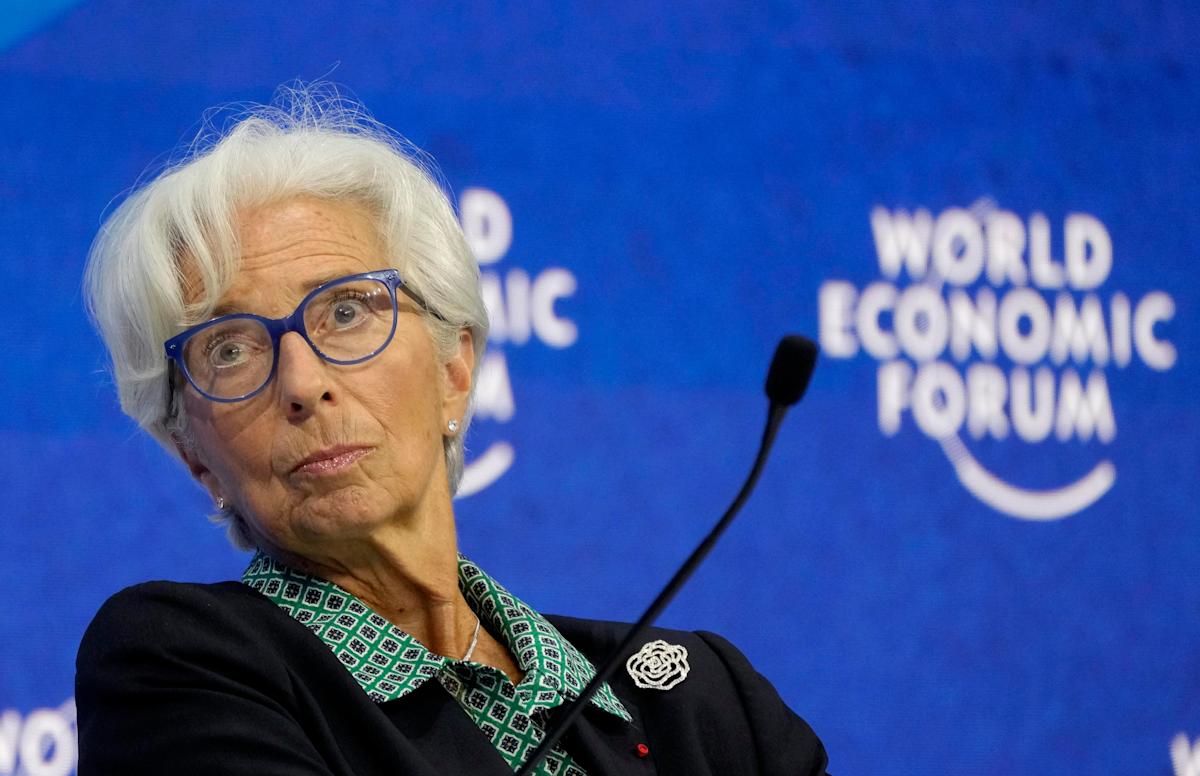
DAVOS, Switzerland (AP) — Financial officials at the World Economic Forum’s annual gathering in Davos say Russia’s war in Ukraine has been a major setback to the global economic recovery.
Gita Gopinath, IMF’s first deputy managing director, said on a panel Wednesday about global growth that “a confluence of shocks” are hitting the world.
She says there’s a cost-of-living crisis as prices of fuel, food and other commodities soar. On top of that, central banks are raising interest rates to tackle high inflation, China is seeing a slowdown amid COVID-19 lockdowns and the real estate sector is facing weaknesses.
European Central Bank President Christine Lagarde says the war in Ukraine has revealed that the problems are especially acute in Europe.
On a panel called European Unity in a Disordered World?, she said, “Europe is 20% more open to global value chains vulnerabilities” than other global markets. Because of that, Lagarde says, “it’s not surprising that the breaking down and the bottlenecks of global value chains affect European companies and us more than others.”
___
The World Economic Forum has unveiled an initiative to develop the metaverse, a virtual reality construct that many tech companies are betting will be the next big thing for the internet.
The metaverse will merge virtual life with real life and create endless new playgrounds and workspaces for users equipped with virtual reality headsets, augmented reality glasses, smartphone apps or other devices.
The forum said Wednesday that it will work with businesses, regulators, civil society and academic experts to help define and build the metaverse. The focus will be on governing the metaverse as well as how to create economic and societal value.
In a panel talk on the metaverse, Facebook parent Meta’s chief product officer, Chris Cox, says he envisioned the need for standards and governance. Meta is betting big on the metaverse as the next big source of the company’s growth.
He says there “will probably be something like a ratings system” for movies, music and other content in the metaverse so parents and young people “can have some sense of what the rules are in the environment that they’re going to walk into.”
Cox compared it to walking into a bar versus a playground, which each have a “different expectation” of the rules that govern those places.
___
A top Saudi official has touted a dual strategy of increasing oil production capacity for export abroad while advocating for a domestic reduction of emissions in line with Saudi Arabia’s net-zero pledge.
Saudi Minister of Economy and Planning Faisal al-Ibrahim said on a panel at the World Economic Forum meeting in Davos that “these two points do not contradict each other.”
He said Wednesday that focusing on climate change without focusing on energy security could lead to more countries burning “the dirtiest kind of coal in a time of need.”
Climate activists and many scientists and energy experts argue otherwise, advocating for an immediate end to greater investment in fossil fuels to keep global temperatures from rising further.
Al-Ibrahim says “energy demand from oil will continue to increase and that higher prices and revenue from oil will help the country reach its 2060 net-zero targets quicker.
___
The World Economic Forum and leaders of some of the world’s largest businesses are announcing the expansion of a partnership aimed at propelling green technologies.
The First Movers Coalition includes businesses that make major purchases around green technologies and down their supply chains. The idea is to send market signals that lead to more investing and scaling up of technologies like green steel, green hydrogen and carbon capture.
On Wednesday, U.S. climate envoy John Kerry was joined by Bill Gates, Salesforce co-CEO Marc Benioff, Google Chief Financial Officer Ruth Porat and several others to announce in Davos that the number of companies had gone from more than 30 to 55.
Sweden, India, Japan, Denmark, the United Kingdom and other countries also joined the partnership, first launched by the U.S. and World Economic Forum.
Gates says “so many green products carry a price premium” compared with established fossil fuel technologies and that “the way you get rid of that is scale up the production.”
The world’s top climate scientists warn that greenhouse gas emissions must be sharply reduced this decade to keep temperature rise to 1.5 degrees C (2.7 F) since pre-industrial times.
___
The CEO of Ukraine’s largest private energy company says it won’t buy any energy from Russia as long as he’s in charge and insists the European Union can start making up for its “dramatic mistake” of growing dependent on Russian oil and natural gas by buying energy from Ukraine.
Maxim Timchenko of DTEK Group told The Associated Press at the World Economic Forum’s gathering in Davos that consumption of its services in Ukraine has dropped 35% since Russia invaded on Feb. 24. He says some of that excess electricity could be shipped to Europe.
Millions of Ukrainians fled their homes during the war, which also has upended business operations and their electricity needs.
Hours before the war erupted, DTEK disconnected from the grids of Belarus and Russia as part of a test run, and Timchenko says it hasn’t restored the connection. In mid-March, he says the company “synchronized” with the EU grid — but only in “emergency mode.”
He says that doesn’t allow the country to get revenue from exporting electricity and that “Ukraine needs this revenue to support financial stability of our energy system.”
___
Ukrainian President Volodymyr Zelenskyy says that his country will not give up its land to end Russia’s war.
Speaking by video link Wednesday at a “Ukrainian breakfast” during the World Economic Forum’s gathering in Davos, Zelenskyy said he didn’t believe Russian president Vladimir Putin fully understood what was going on in Ukraine.
Responding to a question from CNN’s Fareed Zakaria about whether it was possible to negotiate an end to the conflict, Zelenskyy said through a translator that “Ukraine is not going to concede our territory. We are fighting in our country, on our land.”
He added that it’s a war not against anybody but “for our land, for our freedom, for our independence, and for our future.”
As a first step to diplomatic negotiations, Zelenskyy says Russia would need to demonstrate its desire to engage in talks and “should demonstrate at least something like steps withdrawing their troops and equipment to the position before the 24th of February,” when the invasion began.
___
Pfizer says it will provide nearly two dozen products, including its top-selling COVID-19 vaccine and treatment, at not-for-profit prices in some of the world’s poorest countries.
The drugmaker announced the program Wednesday at the World Economic Forum’s annual gathering in Davos, Switzerland, and said it was aimed at improving health equity in 45 lower-income countries. Most of the countries are in Africa, but the list also includes Haiti, Syria, Cambodia and North Korea.
The products, which are widely available in the U.S. and the European Union, include 23 medicines and vaccines that treat infectious diseases, some cancers and rare and inflammatory conditions. Company spokeswoman Pam Eisele says only a small number of the medicines and vaccines are available in the 45 countries.
Eisele says New York-based Pfizer will charge only manufacturing costs and “minimal” distribution expenses. It will comply with any sanctions and all other applicable laws.
This month, the head of the World Health Organization called on Pfizer to make its COVID-19 treatment more widely available in poorer countries.




